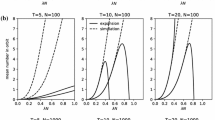Abstract
We describe a queueing theoretic approach to the delay analysis for the class of synchronous random-access protocols consisting of a Capetanakis-type Tree Algorithm for conflict resolution and a window algorithm for channel access. Our method features a stochastic decomposition, in which a major component of the delay is viewed as a discrete time queueing problem, where each window (selected by the channel access algorithm) becomes a customer requiring service in the form of conflict resolution. This technique is sufficiently powerful to give us the distribution of the packet delay in steady state. In this paper, we extend our method to allow the durations of elementary algorithmic steps to take on a general distribution (rather than being constants), which allows us to provide a unified treatment of channels with shared errors, some types of explicit reservation systems, and Local Area Networks with carrier sensing and/or collision detection, possibly in combination with variable size packets.
Similar content being viewed by others
References
D. Bertsekas and R. Gallager,Data Networks, 2nd ed., (Prentice-Hall, Englewood Cliffs, NJ, 1992).
G. Fayolle, P. Flajolet, M. Hofri and P. Jacquet, Analysis of a stack algorithm for random multiple-access communication, IEEE Trans. Inf. Theory IT-31 (1985) 244–254.
L. Georgiadis, L.F. Merakos and P. Papantoni-Kazakos, A method for the delay analysis of random multiple-access algorithms whose delay process is regenerative, IEEE J. Sel. Areas Commun. SAC-5 (1987) 1051–1062.
L. Georgiadis and M. Paterakis, Bounds on the delay distribution of window random-access algorithms, IEEE Trans. Commun. COM-41 (1993) 683–693.
J. Huang and T. Berger, Delay analysis of interval-searching contention resolution algorithms, IEEE Trans. Inf. Theory IT-31 (1985) 264–273.
J.-C. Huang and T. Berger, Delay analysis of 0.487 contention resolution algorithms, IEEE Trans. Commun. COM-34 (1986) 916–926.
L. Kleinrock and F.A. Tobagi, Packet switching in radio channels: Part 1 — Carrier sense multiple-access modes and their throughput-delay characteristics, IEEE Trans. Commun. COM-23 (1975) 1400–1416.
J.F. Kurose, A. Shrivastava and D. Towsley, Stack algorithms for random multiple-access networks in the presence of asymmetric feedback, IEEE Trans. Commun. COM-38 (1990) 1308–1313.
J.L. Massey, Collision-resolution algorithms and random-access communications, in:Multi-User Communications, ed. G. Longo (Springer, New York, 1981).
J.L. Massey (ed.), Special issue on random-access communications, IEEE Trans. Inf. Theory IT-31 (1985).
P. Mathys and P. Flajolet, Q-ary collision resolution algorithms in random-access systems with free or blocked channel access, IEEE Trans. Inf. Theory IT-31 (1985).
L. Merakos and C. Bisdikian, Delay analysis of then-ary stack random-access algorithm, IEEE Trans. Inf. Theory IT-34 (1988) 931–942.
M.L. Molle, Asynchronous multiple access tree algorithms,Proc. ACM Symp. on Communications Architectures and Protocols (ACM SIGCOMM '83) (March 1983).
M.L. Molle and L. Kleinrock, Virtual time CSMA: Why two clocks are better than one, IEEE Trans. Commun. COM-33 (1985).
M.L. Molle, Analysis of a class of distributed queues with applications, Perf. Eval. 9 (1989) 271–286.
G.C. Polyzos, M.L. Molle and A.N. Venetsanopoulos, Performance analysis of finite non-homogeneous population tree conflict resolution algorithms using constant size window access, IEEE Trans. Commun. COM-35 (1987) 1124–1138.
G.C. Polyzos and M.L. Molle, A generalized busy period approach to the delay analysis of window access tree conflict resolution algorithms,Proc. IEEE ICC '87, Seattle, WA (June 1987).
G.C. Polyzos, A queueing theoretic approach to the delay analysis for a class of conflict resolution algorithms, Technical Report CSRI-224, Computer Systems Research Institute, University of Toronto, Toronto, Canada (March 1989) (Ph.D. Dissertation).
G.C. Polyzos and M.L. Molle, Delay analysis for the FCFS 0.487 conflict resolution algorithm, Technical Report CS 90-179, Dept. of Computer Science and Engineering, University of California, San Diego, La Jolla, CA (October 1990).
G.C. Polyzos and M.L. Molle, A queueing theoretic approach to the delay analysis for the FCFS 0.487 conflict resolution algorithm, IEEE Trans. Inf. Theory IT-39 (1993) 1887–1906.
R. Rom and M. Sidi,Multiple Access Protocols (Springer, New York, NY, 1990).
L.D. Servi,D/G/1 queues with vacations, Oper. Res. 34 (1986) 619–629.
T. Suda, J. Jungok Bae and D.C. Baxter, The robustness and performance of tree collision resolution algorithms in an unshared feedback error environment, Comp. Networks ISDN Syst. 18 (1990) 275–292.
D. Towsley and G. Venkatesh, Window random access protocols for local computer networks, IEEE Trans. Comp. C-31 (1982) 715–722.
B.S. Tsybakov and N.B. Likhanov, Upper bound for the delay in a multiple-random-access system with a splitting algorithm, Problemy Peredachi Informatsii 18 (1982) 76–84.
B.S. Tsybakov and N.B. Likhanov, Some new random multiple-access algorithms, Problemy Peredachi Informatsii 21 (1985) 69–89.
N.D. Vvedenskaya and B.S. Tsybakov, Random multiple access of packets to a channel with errors, Problemy Peredachi Informatsii 19 (1983) 69–84.
N.D. Vvedenskaya and B.S. Tsybakov, Computing packet delay for some random multiple access stack algorithms, Problemy Peredachi Informatsii 24 (1988) 94–101.
J.K. Wolf, Born again group testing: multiaccess communications, IEEE Trans. Inf. Theory IT-31 (1985) 185–191.
Author information
Authors and Affiliations
Rights and permissions
About this article
Cite this article
Polyzos, G.C., Molle, M.L. A queueing theoretic methodology for the analysis of separable conflict resolution algorithms with variable length elementary events. Queueing Syst 16, 339–361 (1994). https://doi.org/10.1007/BF01158961
Received:
Revised:
Issue Date:
DOI: https://doi.org/10.1007/BF01158961



